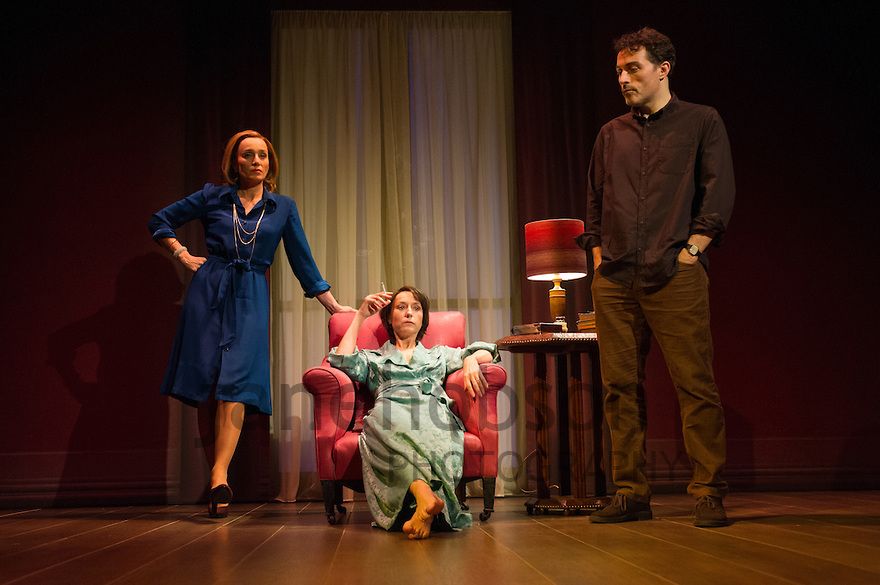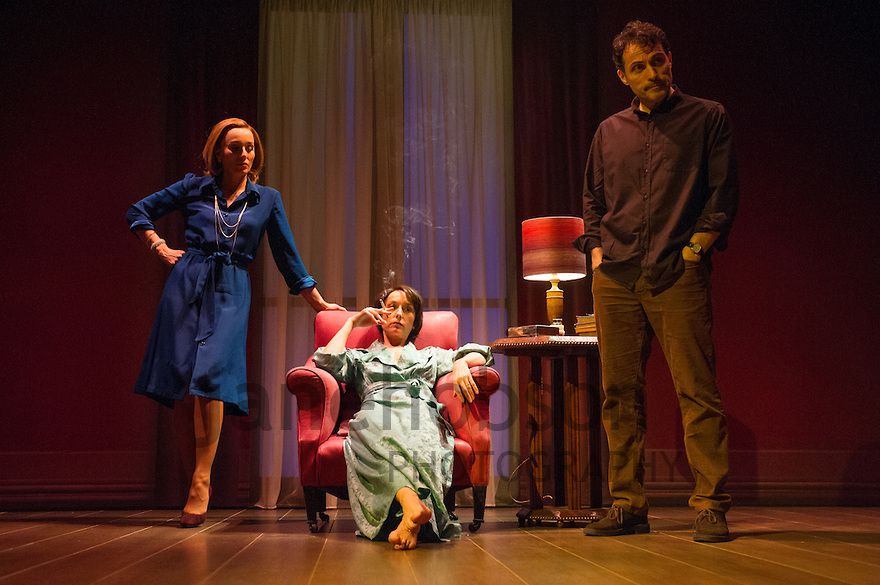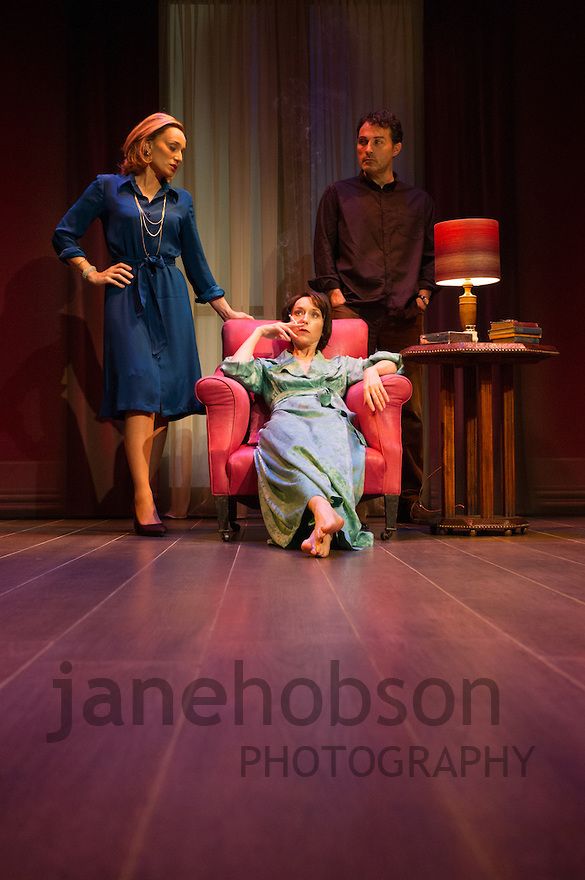"Official" reviews and pics
Feb 18, 2013 20:58:53 GMT
Post by robela on Feb 18, 2013 20:58:53 GMT
Here is a four star review by Michael Billington from the Guardian, Friday 1 February 2013
SPOILER ALERT
Erotically charged Pinter wins casting vote
Kristin Scott Thomas and Lia Williams are currently alternating the two female roles in Harold Pinter's 1971 play with Rufus Sewell as the man in the middle. The result, in Ian Rickson's brilliantly pellucid production, is fascinating. It shows how two actors can take wildly different routes to the same destination and how every line is susceptible to multiple readings.
One reason Pinter's play is so resonant is that it exposes the way we shape the past according to the psychological needs of the present. Deeley, a thriving film-maker, and his wife, Kate, are visited in the country by the latter's onetime flatmate, Anna. What follows is a fierce battle for possession of the withdrawn, cryptically private Kate.The weapons used include snatches of popular songs, physical intimacies and, above all, memory. One of Pinter's main points is that memory is subjective and flexible, so who first took Kate to the cinema to see Carol Reed's Odd Man Out becomes a vital part of the tactical battle between Deeley and Anna. But the final triumph, if such it is, belongs to Kate, who defies all attempts at occupation and remains resolutely herself.
The chemistry changes, however, according to who plays what. Scott Thomas's Anna is cool, classy and ironically mocking in her disdain for Deeley; and that makes all the more shocking the way she in turn is destroyed by William's tough-as-nails, quietly acerbic Kate with the withering line: "I remember you dead". But, while this is the more obviously dramatic combination, I found the reverse pairing even more hypnotic. Williams's Anna is earthy, gossipy, a bit brassy: a figure whom you can easily imagine haunting louche London pubs in the 1950's and whose claims on Kate depend on memories of a shared, rackety past. Meanwhile, Scott Thomas's Kate curls up on the sofa looking as inscrutable as a siamese cat until she at last puts out a devastating claw. You could argue that the dual casting proves Anna and Kate are two sides of the same person: I think that limits Pinter's idea that what we are watching is a ferocious contest for possession of an individual soul.
If Scott Thomas proceeds by stealth and Williams by frontal assault, both are superb and offer the subtlest variations on single lines. But one thing is common to both versions: the total demolition of Deeley's sense of security. And Sewell charts that excellently by starting the play on a note of Coward-like insousiance: even the way he tiptoes over to the brandy bottle, as if being slightly naughty, suggests he takes Anna's visit lightly. What starts as a game turns into a threat to his manhood and when Sewell hisses, through gritted teeth, that the question of Kate's passion "is my province", you know that he is losing the fight. Although Sewell sounds vocally stretched during the exchanges of 1930's popular song, he captures every phase of Deeley's downfall in the minutest detail.
Time and again, Rickson's production illuminates the play: in none of the half dozen versions I've seen has the conflict between Anna and Deeley carried quite such an erotic charge as it does here. And Hildegard Bechtler's spare set and Peter Mumford's autumnal lighting suggest that we are looking at both an austerely chic country house and an anteroom to hell in which all three characters end up locked in permanent solitude. It is a beautifully clear production and one which, through the alternate casting, adds to the bottomless mystery of Pinter's play.
SPOILER ALERT
Erotically charged Pinter wins casting vote
Kristin Scott Thomas and Lia Williams are currently alternating the two female roles in Harold Pinter's 1971 play with Rufus Sewell as the man in the middle. The result, in Ian Rickson's brilliantly pellucid production, is fascinating. It shows how two actors can take wildly different routes to the same destination and how every line is susceptible to multiple readings.
One reason Pinter's play is so resonant is that it exposes the way we shape the past according to the psychological needs of the present. Deeley, a thriving film-maker, and his wife, Kate, are visited in the country by the latter's onetime flatmate, Anna. What follows is a fierce battle for possession of the withdrawn, cryptically private Kate.The weapons used include snatches of popular songs, physical intimacies and, above all, memory. One of Pinter's main points is that memory is subjective and flexible, so who first took Kate to the cinema to see Carol Reed's Odd Man Out becomes a vital part of the tactical battle between Deeley and Anna. But the final triumph, if such it is, belongs to Kate, who defies all attempts at occupation and remains resolutely herself.
The chemistry changes, however, according to who plays what. Scott Thomas's Anna is cool, classy and ironically mocking in her disdain for Deeley; and that makes all the more shocking the way she in turn is destroyed by William's tough-as-nails, quietly acerbic Kate with the withering line: "I remember you dead". But, while this is the more obviously dramatic combination, I found the reverse pairing even more hypnotic. Williams's Anna is earthy, gossipy, a bit brassy: a figure whom you can easily imagine haunting louche London pubs in the 1950's and whose claims on Kate depend on memories of a shared, rackety past. Meanwhile, Scott Thomas's Kate curls up on the sofa looking as inscrutable as a siamese cat until she at last puts out a devastating claw. You could argue that the dual casting proves Anna and Kate are two sides of the same person: I think that limits Pinter's idea that what we are watching is a ferocious contest for possession of an individual soul.
If Scott Thomas proceeds by stealth and Williams by frontal assault, both are superb and offer the subtlest variations on single lines. But one thing is common to both versions: the total demolition of Deeley's sense of security. And Sewell charts that excellently by starting the play on a note of Coward-like insousiance: even the way he tiptoes over to the brandy bottle, as if being slightly naughty, suggests he takes Anna's visit lightly. What starts as a game turns into a threat to his manhood and when Sewell hisses, through gritted teeth, that the question of Kate's passion "is my province", you know that he is losing the fight. Although Sewell sounds vocally stretched during the exchanges of 1930's popular song, he captures every phase of Deeley's downfall in the minutest detail.
Time and again, Rickson's production illuminates the play: in none of the half dozen versions I've seen has the conflict between Anna and Deeley carried quite such an erotic charge as it does here. And Hildegard Bechtler's spare set and Peter Mumford's autumnal lighting suggest that we are looking at both an austerely chic country house and an anteroom to hell in which all three characters end up locked in permanent solitude. It is a beautifully clear production and one which, through the alternate casting, adds to the bottomless mystery of Pinter's play.







 Thanks for that, Rueful!
Thanks for that, Rueful!
 review, the rest being positive!
review, the rest being positive!








 I would not like to be on the receiving end of that look!
I would not like to be on the receiving end of that look!